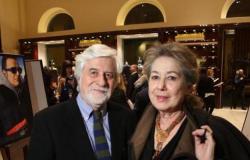With an article entitled Let’s take back the cityby Michele Mognato, ytali has started a discussion, political and otherwise, on ideas and proposals in view of the vote, in a year’s time, for the renewal of the municipal administration of Venice.
Pierpaolo Baretta, Maurizio Cecconi, Sara Arco, Roberto Ellero spoke, Mara Rumiz, Roberto D’Agostino, Tiziana Plebani [con Franca Marcomin, Mara Bianca, Stefania Minozzi]
The privilege of living in Venice
Living in Venice is a privilege, I fully agree with Mara Rumiz’s statement, but it is demanding precisely because of the responsibility consubstantial with the privilege. Because Venice is biology and history, it is a virtuous dialogue between the basic instincts of life and the intelligence that helps those to keep desire alive with the necessary acceptance and form. The privilege of living in Venice is a complex ecosystem dominated by water in which many species coexist and the time that it delivers with the suggestive gestures of the brief passage of a canal, of a street, of a campo with its well, of the alter salizada, of a crooked facade of the building and its reason. And not for the simple pleasure of the eyes, but for what its architecture says and suggests, the profitable and centuries-old dialogue with an amphibious environment and its rules, the simple and intertwined monumental ensembles, models of architecture and living, inspiration for renewal vitality and human satisfaction. There is no doubt, it is a privilege to walk and linger, stop, look for oneself and admire oneself in the buildings and their human, scientific and professional stories, in the liberating, exhilarating and defined factory of the Basilica of San Marco with the Ducal Palace and its two pink columns, the features of power not denied to the population, the small square open to the basin and the tidal wave forever depicted by Vittore Carpaccio.
It is a privilege for those who live in Venice, a virtuous ambition for the widespread and human desire to enter the atmosphere of being and becoming the image, technique and culture of the city, of the Rialto bridge, of the details of the indefinitely temporary one of ‘Academy and in the variety of all four hundred and thirty-six bridges that make the islands, one hundred and twenty-one in number, a unique multitude and city grafted onto the water and permeated by it. And what about the other basilicas and the church of Santa Maria Assunta dei Gesuiti where it makes a splendid display The martyrdom of Saint Lawrence, Titian’s supreme work and the client’s wish? The buildings of political power, Sansovin’s work of the Marciana Library and the drawing that accompanies it to the square, the new and ancient factories of the Rialto, the Scuola Grande di San Marco which became a hospital and remained a wonder, the Fenice and music with its history, the superb Palazzo Vendramin Calergi, Ca’ da Mosto and Ca’ Foscari, the fundamental galleries of the Academy, a splendid journey into a great civilization and its story, are not, obviously, only an artistic testimony for complacent aesthetic contemplation , but also the subject of millions of publications, a vast wealth of knowledge that contributes to environmental, scholastic, scientific and professional training in many sectors such as architecture, engineering, the arts, history, to name a few more well-known ones. And, furthermore, identifying factors, humus of a great current culture and nourishment of the strength and creative capacity of the city and the country. The privilege of living in Venice is being able to do so with aesthetic joy and in the vigorous awareness of being part and expression of a dimension of fundamental artistic, scientific and cultural quality.
The question remains whether and how to preserve such an extraordinary knowledge, qualification and guidance heritage. Well, Venice has the further privilege of the lagoon which is its body, its biology, the visible essence of health without which life has no perspective. And this is no small thing in the midst of ongoing and latent wars, environmental disasters and climate problems, and migratory phenomena involving populations from all continents. These are problems and dangers that suggest the need for radical changes, a culture of coexistence based on the destiny of the species, capable of defining possibilities other than the dubious objectivity of a production system whose advantages are partial and in any case unreliable for the destiny of the world.
Centralism and democracy.
If we really want to talk – and seriously – about the government of Venice, we must have the destiny of man as a context of reference, place its role globally, define Venice’s participation in the fundamental dialogue between biology and history on the basis of the extraordinary synthesis that expresses the lagoon city in relation to these decisive issues.
In Venice it is possible to verify day after day, with real monitoring, what is happening on a global scale, having daily consistency. In the echo offictional remembered by Roberto Ellero at the time of the first red junta, it is almost a duty to believe in a new imagination that transcends the electoral projects of some party that considers power as a place to be occupied to prevent the bad guys from doing so.
And on the other hand, globality cannot be limited to financial or mercantile issues, to affairs that tend to place environmental and climate issues, migratory phenomena and territorial structures in the logic of national interests and in their hierarchical order. The issues are global in the sense that they are still a problem of Buenos Aires and London, of New York and Tokyo, of Johannesburg and Venice. There is no, as we can verify in everyday life, an authority capable of addressing in a comprehensive manner what is everyone’s problem and we need to build a world in which the global problem is local and territorial conscience and its task. It is in this context that politics must be placed, in a space from which the world is vision and territorial management, a widespread practice. Venice must occupy a role in this horizon, possessing in a consubstantial way the problems of biology and history and their importance.
And on the other hand, the lagoon ecosystem, image and condition of a global problem relating to the biological environment and life, is in conflict with an economy and tourism that endanger the value it represents for the destiny of man, with excavation of canals and port traffic that fatally alters the balance of a delicate system.
In detail, “aiming at a residential offer”, for the middle classes, encouraging cultural production, restoration laboratories and schools, research and documentation centers, publishing” is desirable. But how can a residential policy coexist with the increasingly preponderant role of the Biennale which favors the income economy? The destiny of Venice and everything it represents must be seen from the perspective of the city’s meaning in the destiny of man and not in its useful place in the profit society.
We are in an evolutionary phase in which the many postponed problems have become the famous “unkempt knots” that need to be resolved with choices of great importance and scope. The ongoing wars are an expression of economies tied to profit and zones of influence that are disastrous for their functioning. It is therefore possible to foresee that without an action capable of canceling or containing the degree of the clash, this could also increase in intensity. The corporate-type pyramid system on which politics is currently based does not like democracy because it needs decision-making centralism to function effectively. The premiership project put forward by the right-wing government in office is certainly not a circumstantial whim which, unlike the left, knows how to iron out differences precisely in the name of business and not coexistence.
What can really counteract this policy is a vision of the world based on peace, health, dignity, the centrality of coexistence, objectives that are certainly foreign to the corporate criteria that distinguish the current policy, fraught with conflict and dangers not only for a decision-making centralism incapable of communicating with the territories and populations, but for the concentration of all decisions in financial circles that also influence the context where politics is unable to exercise any action to build coexistence. An alternative policy to the current one can only distance itself from business politics where “malfeasance” inevitably thrives. And not only for the contents, but also with a methodology that distributes the problems and the corresponding action across the territories precisely on the basis of their particular potential, to highlight certain problems more.
Venice, its lagoon and its history can indeed be a reference for a way of doing politics suited to the times based on the contiguity between the destiny of the species and the role of the historic city for which the statute is imposed.
Venice, historic city and political proposal was last modified: April 16th, 2024 by FRANCO AVICOLLI
Venice, historic city and political proposal
last edit: 2024-04-16T12:57:17+02:00
from FRANCO AVICOLLI
Subscribe to the ytali newsletter.
Support us
DONATE YOUR 5 PER THOUSAND TO YTALI
Add your signature and tax code 94097630274 in the SUPPORT OF THIRD SECTOR ENTITIES box of your tax return.
Thank you!
Tags: Venice historic city political proposal






